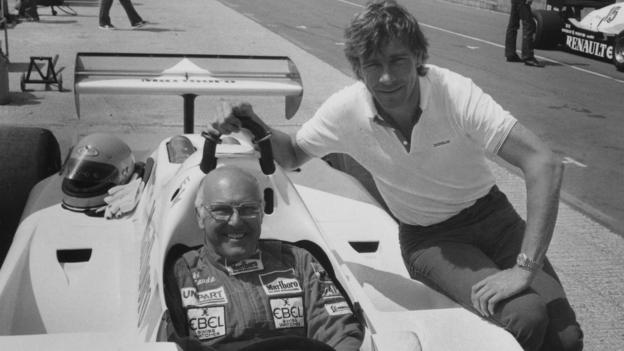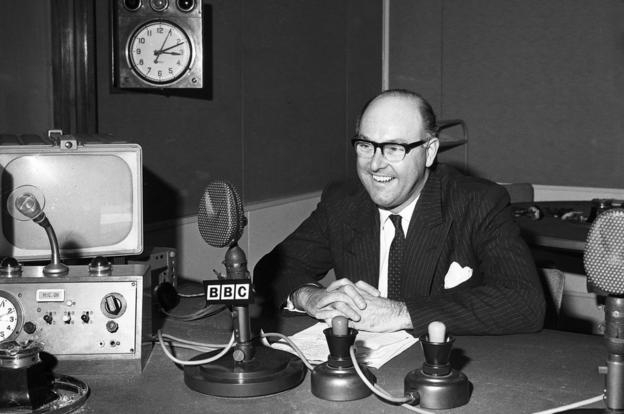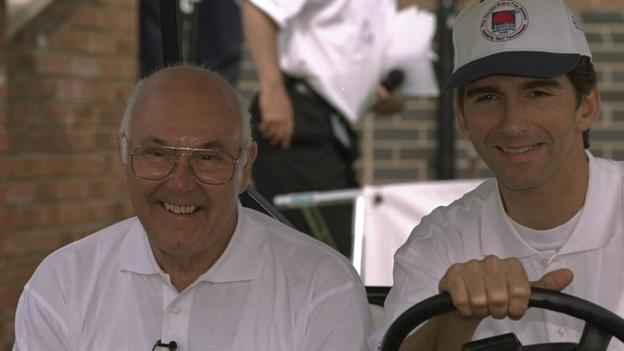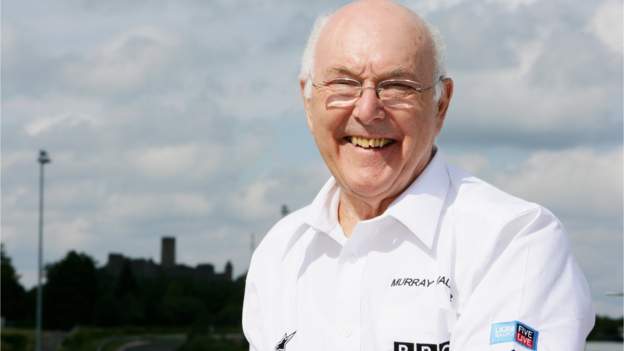Legend is a word bandied around all too easily, but it is a completely appropriate description of Murray Walker.
The Formula 1 broadcasting great, who died on Saturday at the age of 97, was loved by millions across the world for his high-energy motorsport commentary style, peppered with amusing mistakes and malapropisms.
The errors are what made him famous, but it was his natural warmth and effervescent enthusiasm that led the audience to find charming what in almost any other commentator might have been annoying.
In describing Walker’s commentary style, the late broadcaster and writer Clive James hit the nail on the head: “In his quieter moments, he sounds like his trousers are on fire.”
Walker was one of the very few public figures who was taken to heart to the extent that he was nearly always referred to by his first name, not his second. He was simply “Murray”, and it was always said with affection.

Malapropisms and mis-speaking notwithstanding, Walker was a quite brilliant practitioner of his craft.
He might, as he put it himself, have “come over as a slightly over-the-top enthusiast – it is a very exciting sport after all”.
But in fact the impression that he was making things up as he went along could not have been further from the truth.
He worked hard at his preparation and was a commentator of consummate skill – perfectly able to judge what was required in the moments of extreme emotion that peppered his time in F1.
His mouth may well have tended to be a couple of steps ahead of his brain in times of excitement, but when it really mattered he could be relied upon to come up with the perfect response to the situation unfolding in front of his eyes, whether by instinct or judgement.
So his high-pitched waterfall of words in Adelaide in 1986 – “And look at that… and colossally… That’s Mansell!” – exquisitely expressed the shock being simultaneously experienced by millions of TV viewers back in the UK as they watched the Williams driver’s world title hopes explode with his punctured tyre.
But so also was Walker able to expertly shift tone upon swiftly recognising the seriousness of the crash that killed Ayrton Senna at Imola in 1994.

He was a modest man, but at times his natural gift and instinct persuaded him correctly that he should bring himself into the equation. This he did wonderfully in Japan in 1996, when Damon Hill crossed the line finally to win his world championship after three drama-filled years of trying, and Walker said: “And I’ve got to stop because I’ve got a lump in my throat.”
Walker’s secret was that he was genuinely in love with the sport, and he never lost the child-like joy he felt at being able to commentate on it.

Born Graeme Murray Walker on 10 October 1923, after leaving Highgate School he fought in World War II as a tank commander, a role that saw him take part in the brutal Battle of the Reichswald in 1945.
He initially developed a love for motorsport through his father Graham, who was a world-class motorcycle racer, whose success included winning the Isle of Man TT.
Walker briefly raced motorbikes himself before recognising that his talents lay elsewhere, and instead followed his father into commentary, too, initially alongside him at the TT.
He commentated on his first car grand prix race for the BBC at Silverstone in 1949 and continued to work on all forms of motorsport for the BBC and ITV over the next three decades while pursuing a full-time and successful career in advertising.
His company invented the famous slogan, “A Mars a day helps you work rest and play,” although Walker insisted he has been wrongly credited with it himself. But he did admit to coming up with the equally famous jingle: “Opal Fruits – made to make your mouth water” among others.
He did not become a full-time F1 commentator until 1978 – and even then he initially dove-tailed it with his advertising career – but over the next 23 years he was to make the role his own in a way perhaps no other commentator on any other sport has.
Through the 1980s and into the early 1990s, Walker struck up a popular and extremely effective double-act with the former grand prix driver James Hunt.
They were very different characters, and initially Walker disapproved of both Hunt’s approach and lifestyle.
He once famously told viewers that Hunt had “popped out of the commentary box to have a look at the back of the circuit”, when in fact he was smoking a joint, a practice of which Walker most definitely did not approve.
And Walker once told this writer that he resolutely refused to let Hunt see his laboriously researched commentary notes – because he did not see “why the lazy bugger should benefit from all my hard work”.
But whether through the difficult early days of their relationship or later, when they developed a huge mutual respect and became close friends, their partnership was always a brilliantly successful mix of Walker’s wide-eyed enthusiasm and Hunt’s languid and eloquent determination to say exactly what he thought.
Walker’s public persona was part of his charm. He came across as someone who refused to see any negatives about the sport he loved, and who certainly would not voice them professionally.
In private, he was equally charming and likeable – but unsurprisingly different. An intelligent and perceptive man, and far more cerebral and considered than his image would suggest, he was well aware of some of the darker sides of the sport, and enjoyed a gossip as much as anyone.
He also had a well developed and dry sense of humour. This writer remembers one particularly dreary, typically damp and cold afternoon at Germany’s Nurburgring. We were killing time chatting, gazing out of the window at the blanket of grey covering the Eifel forests when he said: “Do you know? I can remember driving across there in a tank.”
Walker carried on commentating with the BBC until 1996, alongside Jonathan Palmer following Hunt’s untimely death in 1993, and then, when the corporation lost the rights, with ITV alongside Martin Brundle, until finally calling it at a day in 2001, just short of his 78th birthday.
To the end, his commentaries were as strong as ever and the F1 world – even those from outside the UK who had rarely if ever heard his work – was sorry to see him go, while accepting that it was better to do it before the quality tailed off.
Walker, who is survived by his wife Elizabeth, was a hugely popular character within F1, and even after his retirement was greeted with respect and almost reverence by current stars such as Lewis Hamilton and Fernando Alonso, whose careers in some cases he had not even covered.
His inherent modesty, though, meant he was always surprised and genuinely touched by any recognition afforded him – never more so than at the 1996 British Grand Prix, when he was persuaded to go on the pre-race drivers’ parade around the track, and was celebrated with more cheers from the crowd than any of the drivers, to whom Walker looked up to with admiration that bordered on worship.
Even into his 80s, he was making occasional appearances in live BBC F1 programmes, in Monaco or at Silverstone, and in a brief spell in the commentary box at the 2011 British Grand Prix, he proved that the ability to find a choice phrase had not deserted him.
Sports commentary has moved on to the point where the mistakes that made Walker famous would probably not be tolerated any more. Equally, it’s hard to imagine a commentator who, while making them, could fill his audience with such joy, and pass on so effectively his own consuming passion for what he was talking about.
Murray Walker truly was one of a kind.
